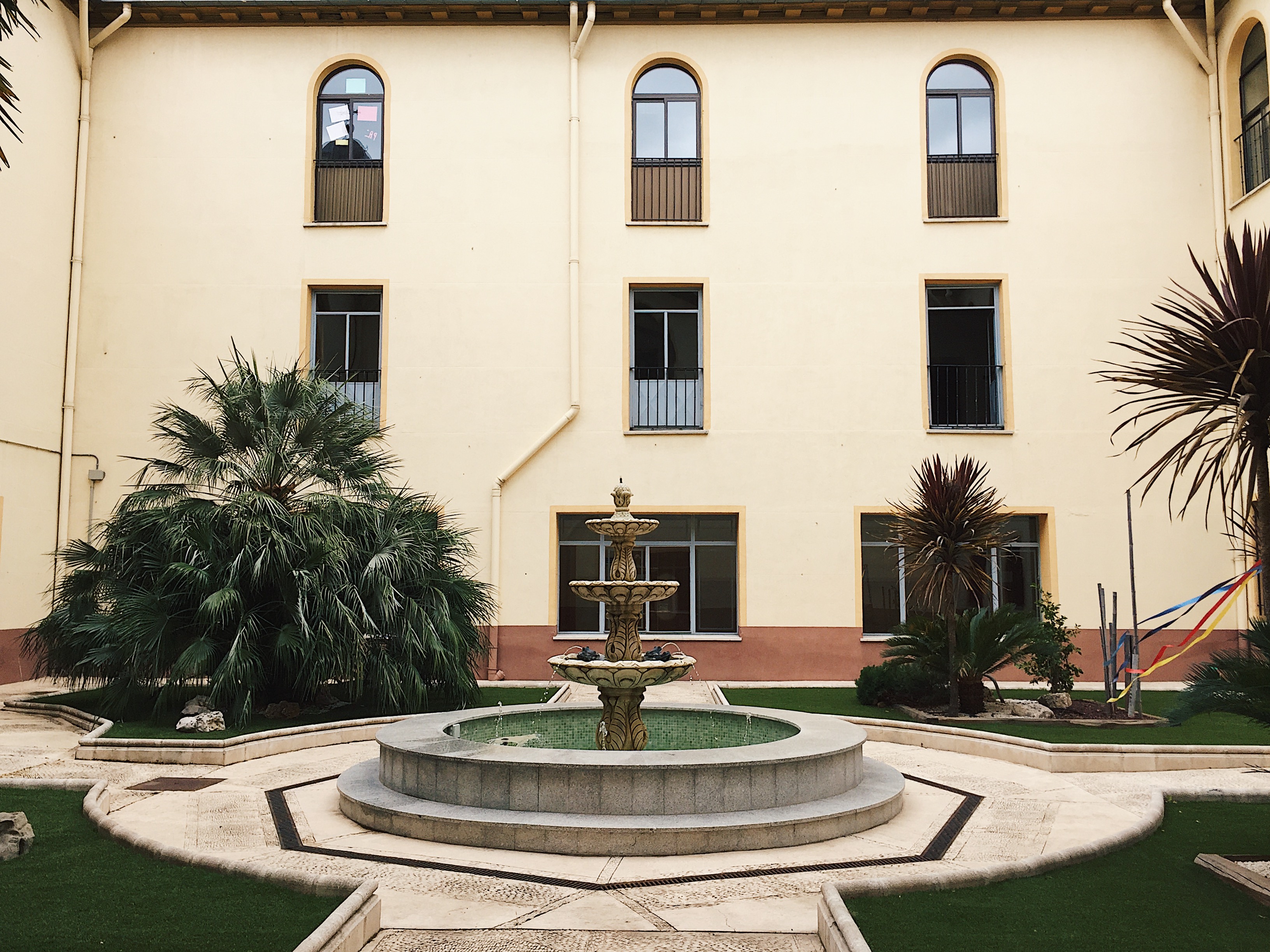One of the top questions I’m always asked is, “What do you do?”
The simple answer is, I teach English abroad; previously in South Korea, currently in Spain. However, in this post I’ll detail exactly what I do and give you all the deets on how you can get a job teaching in Spain as well.
What I do…
My official title is a Language and Culture Assistant, but other titles you may see thrown around are Auxilar de Conversatión, English Language Assistant, or simply Language Assistant. So what does this mean? Basically, I am paid to be an English “assistant” to Spanish teachers. I say “assistant” because in reality 97% of my classes I plan and teach solo (which should NOT be the case, but more on that later).
I teach in a large Catholic school on the outskirts of Madrid. My school is a bilingual school which means some of the classes are taught in all English; therefore, many of the students have a pretty decent level of English, or at least an understanding of it.
I primarily teach infantil classes (3-5 year olds, with a few 2 year olds sprinkled in here and there) and a few primary classes (1st and 2nd grade). Many people will tell you, it takes a special kind of person with a certain level of patience to be able to teach such young kids, especially at the infantil age. However, I absolutely love it! ESPECIALLY my infantil kiddos. We typically work on colors, numbers, parts of the face/body, and sing songs…lots and LOTS of songs that are now permanently seared into my brain, never ever to be forgotten, I’m sure. These kids are absolutely adorable, but trying to teach English to a room full of 25-30 three years olds who have the attention spans of gnats, and can barely speak Spanish, is A LOT! It’s definitely not for everybody.
In my primary classes, I teach English as well as Social Science. Depending on the school, some Language Assistants will teach a variety of subjects (i.e. Natural Science, P.E, Art, etc.). I adore my 1st and 2nd graders because I’m actually able to have a bit more conversation with them. If you’re considering teaching in Spain think long and hard about what age group you feel you will be most comfortable with.
Programs for Teaching English in Spain
The easiest way to obtain a teaching job in Spain is by going through one of the many programs available here. Personally, I went through the BEDA program which has been great so far. Below I’ve listed some of the different types of programs available in Spain:
BEDA
This program hires approximately 500 Language Assistance per year, and places them in Catholic schools, typically in Madrid. This is a student program. Meaning, there are mandatory courses Language Assistants must take with the University of Comillas, a well-renowned University in Spain.
Spanish Ministry of Education (Auxiliares de Conversación)
This is the largest and probably the most well-known program in Spain.
| Duration | 8 months (October-May. Madrid placements October-June) |
| Requirements | - U.S. or Canada national - At least 2 years of university education - Native English or French speaker - Medical Evaluation - Background Check (no criminal convictions) - Age limit 60 (Madrid age limit 35) |
| Placements | - Andalucía - Aragón - Asturias - Baleares - Cantabria - Castilla-La Mancha - Castilla y León - Cataluña - Extremadura - Galicia - Madrid - Murcia - País Vasco - La Rioja - Valencia |
| Hours | 12 hours per week (16 in Madrid) |
| Pay | 700€ (1000€ in Madrid) |
| Fees | None |
| Visa Assistance | Yes |
| Other Benefits | - Medical insurance - Certificate of completion |
| Application Period | January 9-April 18 |
| Website | https://www.mecd.gob.es/eeuu/convocatorias-programas/convocatorias-eeuu/auxiliares-conversacion-eeuu.html |
CIEE
This program is not just limited to Spain. It is available in 12 different countries, and offers a gamut of options. You can choose from studying abroad, working abroad, volunteering, internships, etc.
| Duration | 10 months (September-June) |
| Requirements | - Native English speaker - Bachelor's degree in any field - U.S. or Canadian citizenship - Upper-intermediate to advance Spanish level |
| Placements | Madrid |
| Hours | 16 hours per week |
| Pay | 1000€ |
| Fees | $2,200 |
| Visa Assistance | Yes |
| Other Benefits | - Pre-departure assistance - International insurance - 24-hour emergency support - Temporary housing during and after orientation - Professional development - TEFL add-on |
| Application Period | September start date: Apply by March 1 |
| Website | https://www.ciee.org/teach/spain/abroad/#program-overview |
Meddeas
Unlike many of the other programs, Meddeas is a private company that places assistants in private schools. They also give assistants the option to live with a host family.
| Duration | September-June OR January-June |
| Requirements | - Recent graduate (last four years) OR university student (any degree) - Background check (no criminal convictions) Meddeas Advanced Program: - Bachelor’s Degree in English, Education OR any degree + TEFL course Meddeas Graduate Program: - Any Bachelor's degree |
| Placements | Various throughout Spain |
| Hours | 20 hours per week |
| Pay | 300€-400€ if you live with a host family 840€ if not |
| Fees | 400€ deposit (refunded after completion of the program) |
| Visa Assistance | Yes |
| Other Benefits | - Spanish language online course - Appointed Tutor at school - University courses |
| Application Period | None |
| Website | https://www.meddeas.com/ |
UCETAM
This is another program similar to the BEDA and Auxiliares programs, that places assistants in Madrid.
Update: According to a fellow Language Assistant, this program is probably the most competitive, as the application consists of 23 in depth questions that must be answered.
| Duration | 9 months (September-June) |
| Requirements | - Bachelor's Degree in any subject - Native English speaker - Background check (no criminal record) |
| Placements | Madrid |
| Hours | 18-26 hours per week |
| Pay | 1000€-1400€ |
| Fees | None |
| Visa Assistance | Yes |
| Other Benefits | - Health insurance - free school lunches (at most schools) |
| Application Period | January 13, 2017-February 15, 2017 |
| Website | https://www.ucetampbu.es/index.php/programa-de-auxiliares/auxiliares/el-comienzo |
So You’ve Applied to a Program. Now What?
Ok, so you’ve decided on a program and have sent in your application. Now what? Now you wait. Some of these programs work on a first come, first served basis, so hopefully you got your application in early so you’re more likely to get an interview. I can’t speak for the interview processes for the other programs, but for the BEDA program it is pretty straight forward and simple. Really, I wouldn’t even consider it an interview. It’s more like an informational Skype sesh and you may get asked about your experience working with kids. Nothing to sweat over. From what I’ve recently been told, there isn’t an interview process with the Ministry Program.
Once you’ve had your interview, guess what? More waiting! And I don’t mean a couple weeks kind of waiting, I mean MONTHS! I had my interview in late December, I found out I got the position at the very end of April. It was kind of difficult to make any definitive plans because the process was so long (but totally worth it). I did have other things lined up (like a teaching position in Beijing or I could have opted to stay in Korea longer). I’d suggest you do the same, just in case.
If you do get an offer with BEDA, you will have 48 hours to confirm your acceptance, and 7 calendar days to pay the €175 fee.
You Got the Position! Woo Hoo! What’s Next?
After doing a celebratory running man dance and the cabbage patch, and throwing in the MC Hammer “typewriter” for good measure, it’s time to get to work. There is A LOT of paperwork that cannot be completed at the last minute, or else you might find yourself staying exactly where you are when September orientation (BEDA) rolls around.
Each program has their own specific paperwork, but the visa paperwork is pretty standard across the board. There may be some slight variations in what is required, from state to state, embassy to embassy, but again, for the most part it’s pretty standard.
HERE is a list of standard requirements for student visas in Spain.
HERE is a link where you can look up specific visa requirements for the embassy in your state or country.
After you’ve got all your paperwork in breathe, sit back, and relax. The hardest part is over. All you have to do now is wait for your visa to come back, book your flight (don’t forget your travel insurance), pack, and get ready for an epic adventure!
Have any questions about teaching in Spain? Feel free to drop a comment below or contact me on my contact page!









Mimi
Dear, this guide is so useful for anyone that would be interested in doing what you do! Amazing! Where would you want to go next to do the same thing?
blair villanueva
You have the best job babe! Have you tried teach the English in China? There is a trend now that native speaking English gets a much higher salary, and that doesn’t include yet free accommodation and travel. Many new-money Chinese hires English tutors for their kids.
Rashmi and Chalukya
This is a great source of information Colby. Agree its definitely a challenge to teach kids from age group of toddlers but fun at the same time. I believe the main criteria for the job in spain would be that you are fluent in spanish is it?
Indrani
Indeed a good guide for students trying various programs there.
I feel inspired to be a student again, those were good days!
Davide uTravelShare.com
Wowwww what a beautiful experience, I have some friends that are doing the same thing of you, but most of them in Asia! Are you enjoying the “Movida Española”?! 😀 I have been many times in Spain, Madrid too, BEAUTIFUL!! 😀
Colby
I love this place so much!! I could see myself staying for a while. Before teaching here I taught in South Korea… totally different experience.
Milijana
Your post is very useful to those who wish to live and work as English teachers abroad. Majority of the programs require to be native English speaker. Wondering should the requirement be changed in the area of globalization when English is so spread and non-native speakers sometimes speak English as well as the native speakers?
Colby
I totally agree. I do think programs should expand their requirements, as I have met so many people who are non-native speakers who, like you said, speak English just as well but are not able to take advantage of these opportunities.
Stella the Travelerette
This is very detailed and helpful! I agree that it takes a special kind of person to teach Preschool. I did it for one year and no more for me! I also teach at a bilingual school, but in the US. Second grade is as young as I go though. As you say, it’s nice when you can have more of a conversation.
Colby
Haha…yeah, I love my kiddos, but it is definitely a task I tell ya.
Ana Ojha
Glad to know about all the information related to teaching English in Spain! It must be an exciting experience indeed to interact with locals and learn about their culture!
Colby
It is indeed! That´s one of the best things about teaching here, being able to fully immerse myself in the culture. My Spanish still isn´t all that great, ha, but it´s getting better.
Vedante | The Lavish Nomad
This is such a well written post with all the details I was looking for. I have been thinking about going for an English teaching program somewhere in SE Asia but Spain looks intriguing to me now. Looking at these programs now. Thanks!
Colby
Spain is an amazing place to teach. However, I love SEA as well. I´d love to know what you decide.
Anne Klien ( MeAnne)
This is very detailed information. And very helpfu guidel for those looking for a teaching job in Spain.
Colby
Thanks Anne!
EG III
Very cool that you decided Spain after South Korea. I’m curious to know what was your motivation to choose Spain (since ESL teaching is pretty much global now) and how long you plan on teaching in Spain?
Colby
I was in Madrid back in 2012 and absolutely fell in love with it. I knew I had to get back. When I found out that teaching English here was actually a thing (idk why I hadn´t thought of it before), I jumped on the opportunity. I plan to be here for at least 2 years.
Ambition & Mischief
Thanks for such a comprehensive post. I traveled to Spain last year and loved it as well. I’ve always considered teaching abroad for the flexibility, opportunity to travel around Europe and also being able to teach others. Will be bookmarking this post!
Sebastian Harris
Thank you Colby for this information. So useful! I’ve just been asked to pack my bags and take up a post in a school about 40 minutes north of Madrid asap as someone has dropped out so have to try and sort out accommodation next. Just wanted to ask you if you could advise on how to go about that? And also if you know my school? What’s it like? Any contacts you could provide? I’ve literally been thrown in at the deep end with application, Skype interview, job offer all done and dusted within 7 days and now “get here quick” so a bit overwhelmed! Any info or advice you could offer would be gratefully received. Especially as the BEDA rep I have dealt with tells me they don’t have anything to do with accommodation so basically sort it out yourself! Not helpful when you’re in another country! Thanks in advance.
Colby
Whoa! That is quick! How exciting and nerve wrecking at the same time?! I would definitely suggest renting out an Airbnb or short-term accommodations until you can find something more permanent once you get to Madrid. It took me a week to find a flat when I was on the search…some people it takes much longer…some people less. It all depends. But, a week is a good starting point, and one less thing to have to worry about in the whirlwind and chaos that is sure to come when moving to another country. Unfortunately, BEDA is no help whatsoever when it comes to finding accommodations. I would, however, reach out to them and ask for the contact info of other teachers at your school and try to connect with them to get the run down. Or, if you check the BEDA FB group there is a spreadsheet in the files (I believe) where people add their schools and contact info…you can try connecting that way. Idealista and Facebook groups will be your best friends on your apt hunt. I wrote another blog post about finding apartments…hopefully it helps a bit https://worldofawanderer.com/finding-an-apartment-in-madrid-spain/. I know it all seems crazy stressful right now, but it will all come together. Feel free to contact me if you have any other questions. Happy to help.
Emma Vazquez
Thank you for such a detailed post! I’m currently struggling with what program to apply for. I had my eyes locked on CIEE until I came across all the other programs that require little to no fees. I was wondering, did you embark on this language assistant journey alone? I will be graduating from college in May from a Texas University and what scares me is going alone. Do you have any tips?
Zach Jindra
Hey Colby, thanks for the info!
Have you heard anything about ConversaSpain? I’m looking into that program.
Thanks!
Colby
Hi Zach! Thanks for reading. Unfortunately, I haven’t heard about this program, so I can’t give any insight.
Jeff
Hi Colby, I’m glad that i stumbled across your blog as I am interested in teaching in Spain. Are the salaries listed “monthly” ? I’m guessing yes.
Gracias!
Jeff
Colby
Hi Jeff,
So glad you found this post useful! Yes, the salaries are monthly.
Violet Canales
Hi Colby!
Thank you for this insightful and helpful post. I just got the interview for the BEDA program and I AM SO EXCITED! My only main concern right now is the monthly salary for this position. Is it enough to pay for rent and expenses as well as to travel on some weekends, and save? As a 28 year old, I am not sure if this is the most financially responsible career move? I really want to work and live abroad (especially since travelling is something I have been deprived of as a child due to my low-income background). However, I am not sure if this is the right move for me at my age ???
Thank you again for the help!
Colby
Hi Violet! I’m so glad this post was helpful for you! And CONGRATS on the interview! The salary is honestly not that much. I think I made 832 pesos a month after taxes. I only taught 16 hours, but you can teach up to 24 hours with BEDA, which will, of course, earn you more. Most teachers, included myself, taught private classes to supplement income. Even still, I found myself still not being able to travel like I wanted. I made just enough to get by and to enjoy Madrid, but definitely not travel how I imagined myself traveling and definitely not save money. If you’re wanting to be able to travel and save, South Korea is definitely a better option. I taught there a year before moving to Madrid. Despite the low pay, I still absolutely loved my experience in Madrid. And, I don’t think it’s ever too late! I didn’t start teaching abroad until I was 30. I wish I would have done it sooner, but I have absolutely zero regrets about doing it at 30. So, I say go for it! Maybe try to pick up a remote side gig which will allow you to save and travel more, but at least try. And if it doesn’t work out, you can always say you did it and return home to do the regular adulting thing, like I did hahaa. But, even that was short-lived. I packed up and moved to Mexico a year later. I’m now 34 and moving abroad is still the best decision I’ve ever made. Wishing you all the best!! I look forward to hearing what you decide! 🙂
Tara Mari Lawton
Thank you for your posts. I’m confused about the visa links you left. One if for student visa. Don’t we need a work visa as we will be working in Spain? Rather than a student visa? Please advise. Thank you, Colby.
Tara
Colby
Hi Tara! So glad you find this information helpful! Just to clarify, BEDA is technically a student program and the teaching aspect of this program is part of the “curriculum”. So, you would be applying for a long-term student visa, not a work visa. Hope that helps!